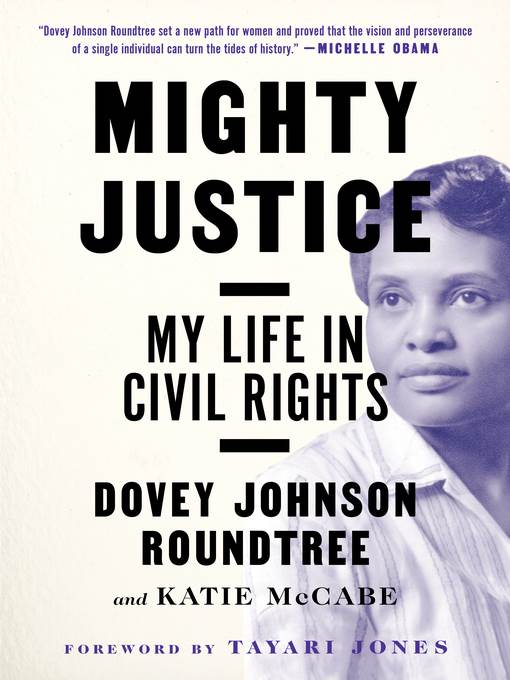
Mighty Justice
My Life in Civil Rights
کتاب های مرتبط
- اطلاعات
- نقد و بررسی
- دیدگاه کاربران
نقد و بررسی

August 12, 2019
The life of African-American civil rights lawyer Roundtree (1914–2018) is chronicled in this inspirational, history-rich memoir, a project coauthored by National Magazine Award–winning writer McCabe. Roundtree grew up in Charlotte, N.C., during the Jim Crow era: “Never for one moment of my life under Jim Crow did I grow accustomed to being excluded, banned, pushed aside, reduced,” she writes. She recounts her time at Spelman College in the 1930s, when Atlanta was a “racial hell,” and tells of joining the newly established Women’s Army Auxiliary Corps during WWII, when she fought for the rights of black soldiers and attained the rank of captain. She later pursued a law degree at Howard University, where she was one of five women in her class; was sworn into the Washington, D.C., bar in 1951; and started a law firm. In straightforward, somewhat dutiful prose, she covers her many transformative moments, including being in the courtroom as a spectator when Plessy v. Ferguson was overturned in 1954, and winning a critical travel-discrimination case in 1955 that helped end the segregation of bus passengers in America. This eye-opening, accessible book documents the life of a trailblazing human rights advocate.

Starred review from September 1, 2019
In this memoir, cowritten with McCabe (Justice Older Than the Law), Roundtree, who died in 2018, recounts the remarkable accomplishments and struggles of a life spent breaking new ground in the fight for racial equality. Roundtree began contributing to the civil rights movement when she entered the first class of Women's Army Auxiliary Corps (WAAC) officers in 1942, rising to the rank of captain while standing firm against the army's policy of segregation. After earning a law degree from Howard University, Roundtree and her law partner took on the notoriously pro-segregation Interstate Commerce Commission, winning a landmark 1955 decision that prohibited bus lines from segregating passengers on journeys and inside bus station facilities. Throughout, Roundtree relates her triumphs and personal tragedies with an honesty and optimism borne of the religious faith that inspired her to add ordination as a minister to her long list of attainments. Readers will find her dogged certainty in the inevitable triumph of justice in times of social upheaval both timely and inspiring. VERDICT This superb work should ensure that Roundtree receives the recognition she richly deserves.--Sara Shreve, Newton, KS
Copyright 2019 Library Journal, LLC Used with permission.

September 1, 2019
A distinguished African American attorney's account of how growing up in the Jim Crow South impacted her later struggle to overturn desegregation laws. Segregation was a hard fact of life for African Americans when North Carolina native Roundtree (1914-2018) was a child. Undaunted, her mother pushed her and her sisters to become "women of destiny" by pursuing their educations. The author excelled in school and was accepted to Spelman College in Atlanta. After a short stint teaching, she traveled to Washington, D.C., where she went to work for Dr. Mary McLeod Bethune, who recommended her for the newly formed Women's Army Auxiliary Corps. Roundtree took her first stand against racism while in the military when she successfully spoke out against Army plans to segregate the WAAC. At the end of the war, she was offered a position with the Fair Employment Practices Committee in California. She had initially wanted to go to medical school, but she soon came to realize that a law degree would best serve her desire to "chang[e] the world in which I'd come of age." Roundtree attended Howard University School of Law and then began the legal work that would lead to the eventual "shattering of Jim Crow." In 1955, she won a major victory in the Sarah Keys v. Carolina Coach Company case, which helped bring about the end of the separate-but-equal practices that had been at the heart of segregation laws. Her law practice thrived, but a period of ill health and "nagging restlessness" caused her to turn to her religion for solace. Later, she enrolled in the Howard University Divinity School and became one of the first ordained female ministers in the African Methodist Episcopal Church and a leading light in "yet another war, a war for [abused] children." Thoughtful and highly inspiring, this book, co-authored by McCabe, is not only a moving memoir; it is also an important contribution to the history of civil rights in America. Tayari Jones provides the foreword. An eloquently told story that should make an impact.
COPYRIGHT(2019) Kirkus Reviews, ALL RIGHTS RESERVED.

























دیدگاه کاربران